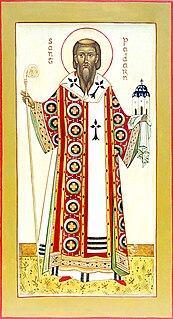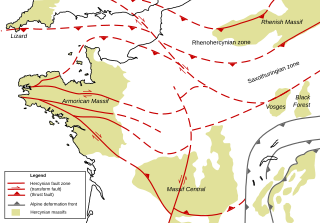
Brittany is a peninsula, historical country, and cultural area in the west of modern France, covering the western part of what was known as Armorica during the period of Roman occupation. It became an independent kingdom and then a duchy before being united with the Kingdom of France in 1532 as a province governed as a separate nation under the crown.

Armorica or Aremorica is the name given in ancient times to the part of Gaul between the Seine and the Loire that includes the Brittany Peninsula, extending inland to an indeterminate point and down the Atlantic Coast.

Dumnonia is the Latinised name for a Brythonic kingdom that existed in Sub-Roman Britain between the late 4th and late 8th centuries CE in the more westerly parts of present-day South West England. It was centred in the area of modern Devon, but also included modern Cornwall and part of Somerset, with its eastern boundary changing over time as the gradual westward expansion of the neighbouring Anglo-Saxon kingdom of Wessex encroached on its territory. The spelling Damnonia is sometimes encountered, but that spelling is also used for the land of the Damnonii, later part of the Kingdom of Strathclyde, in present-day southern Scotland. The form Domnonia also occurs and shares a linguistic relationship with the Breton region of Domnonée.

Cornouaille is a historical region on the west coast of Brittany in West France. The name is cognate with Cornwall in neighbouring Great Britain. This can be explained by the settlement of Cornouaille by migrant princes from Cornwall who created an independent principality founded by Rivelen Mor Marthou, and the founding of the Bishopric of Cornouaille by ancient saints from Cornwall. Celtic Britons and the settlers in Brittany spoke a common language, this language would evolve into Breton, Welsh and Cornish.

Rennes, France, is the administrative capital of the French department of Ille-et-Vilaine. Before the French Revolution, prior to the integration of the Duchy of Brittany into the Kingdom of France, Rennes was the capital of the duchy, with the other historical capitals of Brittany's Ducal period being Nantes and Vannes. It has a long history due to its location at the confluence of two rivers and its proximity to the bordering regions from which arose various challenges to the borders of Brittany.

The Veneti were a Gallic tribe dwelling in Armorica, in the northern part of the Brittany Peninsula, during the Iron Age and the Roman period.
Domnonée is the modern French form of Domnonia or Dumnonia, a historic kingdom in northern Armorica (Brittany) founded by British immigrants from Dumnonia fleeing the Saxon invasions of Britain in the early Middle Ages. Headed by the same ruling family, it was variously separated from or united with its motherland, and its Latin name was used for both indiscriminately. The mainland territory of Domnonée included Trégor, Dol-de-Bretagne through to Goélo, and Penthièvre.

The Caledonian orogeny was a mountain-building era recorded in the northern parts of the British Isles, the Scandinavian Mountains, Svalbard, eastern Greenland and parts of north-central Europe. The Caledonian orogeny encompasses events that occurred from the Ordovician to Early Devonian, roughly 490–390 million years ago (Ma). It was caused by the closure of the Iapetus Ocean when the continents and terranes of Laurentia, Baltica and Avalonia collided.
The Cadomian Orogeny was a tectonic event or series of events in the late Neoproterozoic, about 650–550 Ma, which probably included the formation of mountains. This occurred on the margin of the Gondwana continent, involving one or more collisions of island arcs and accretion of other material at a subduction zone. The precise events, and geographical position, are uncertain, but are thought to involve the terranes of Avalonia, Armorica and Iberia. Rocks deformed in the orogeny are found in several areas of Europe, including northern France, the English Midlands, southern Germany, Bohemia, southern Poland and the southwest Iberian Peninsula. The name comes from Cadomus, the Latin name for Caen, northern France. L Bertrand gave the orogeny its name in 1921, naming it after Cadomus the Gaulish name for Caen in Normandy. He defined the end as being marked by Lower Palaeozoic red beds.

Padarn was an early 6th century sanctified British Christian abbot-bishop who founded St Padarn's Church in Ceredigion, Wales. The first bishop of Braga and Saint Paternus of Avranches in Normandy appear to be the same person. Padarn built a monastery in Vannes and is considered one of the seven founding saints of Brittany. Padarn's early vita is one of five insular and two Breton saints' lives that mention King Arthur independently of Geoffrey of Monmouth's Historia Regum Britanniae.
America is a short-form name for the United States of America.

The Armorican Massif is a geologic massif that covers a large area in the northwest of France, including Brittany, the western part of Normandy and the Pays de la Loire. It is important because it is connected to Dover on the British side of the English Channel and there has been tilting back and forth that has controlled the geography on both sides.

The Andecavi were a Gallic tribe dwelling in Aremorica during the Roman period.
Armorica is a card game designed by Eric B. Vogel, and published in June 2010 by Vainglorious Games in English. Players in Armorica are administrators in the ancient land of Armorica who are trying to convince wealthy Romans to support them and give them prestige.

The Armorican terrane, Armorican terrane assemblage, or simply Armorica, was a microcontinent or group of continental fragments that rifted away from Gondwana towards the end of the Silurian and collided with Laurussia towards the end of the Carboniferous during the Variscan orogeny. The name is taken from Armorica, the Gaulish name for a large part of northwestern France that includes Brittany, as this matches closely to the present location of the rock units that form the main part of this terrane.
American(s) may refer to:
This page is based on this
Wikipedia article Text is available under the
CC BY-SA 4.0 license; additional terms may apply.
Images, videos and audio are available under their respective licenses.










